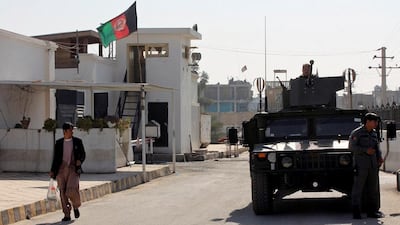KABUL // For the long-suffering residents of Kandahar, the attack that killed five Emiratis earlier this month confirmed that the last 15-years of war have damaged the southern Afghan city beyond repair.
The bombing, carried out by unknown assailants at the governor’s compound on January 10, left more than 30 people dead or injured. Among the wounded was the UAE ambassador to the country, Juma Al Kaabi.
Since then, however, the death toll has continued to rise — adding to the shroud of anger, fear and despair that hangs over a city where sudden acts of violence are now a routine part of life.
Last Monday Hashim Khan Karzai, the cousin of the former Afghan president Hamid Karzai, died in hospital from wounds sustained in the bombing. He was 58.
Hashim Khan’s brother, Haji Mohammed Qasim Karzai, reacted to the news in a way that is increasingly common among relatives of those killed in the war: he blamed the Afghan state for failing in its duty to maintain security.
“This is the sin of the government,” he told The National. “If a bomb can be set inside the governor’s office there is no hope for the safety of ordinary local people.”
The January 10 attack occurred following a ceremony held earlier that day to mark the laying of a foundation stone for a new UAE-funded orphanage, to be built in Kandahar on land donated by Hashim.
After the ceremony Afghan officials and the Emirati delegation went to the heavily guarded guesthouse of the provincial governor. A bomb hidden in the furniture there exploded that evening.
Hashim was rushed to a military hospital at Kandahar airport but after initially appearing to be in a stable condition, he fell into a coma. Relatives hired a plane to take him to India for urgent medical treatment and he died there on January 16.
Much of the wider Karzai clan fled Afghanistan after the 1978 communist coup and Hashim Khan had roots in both Kandahar and the US. He also owned a house in Dubai.
The attack was yet another devastating blow to Kandahar, one of Afghanistan’s most strategically important and notoriously complex cities.
Before the 2001 US-led invasion, it was the spiritual home of the Taliban government and relatively secure thanks to the regime’s strict interpretation of Sharia. The city has since become synonymous with the relentless violence that has swept across Afghanistan.
“Kandahar has been destroyed,” said Mr Karzai. “All its well-known intellectuals and its educated and experienced men have been martyred.”
Insurgents, criminal networks, warlords and corrupt government officials operate in and around the city, sometimes in tandem with each other. This often makes it impossible to know who is behind attacks like the one on January 10.
The UAE is conducting an investigation into the bombing and the Afghan government has claimed the Taliban were responsible with help from “foreign hands” — usually a reference to Pakistan. The Taliban deny responsibility.
There has been speculation in Afghanistan that the intended target was Kandahar’s chief of police, Brigadier General Abdul Raziq, a protégé of US forces, who left the scene moments before the explosion.
Human rights groups have accused Brig Gen Raziq of murder, forced disappearances and torture. He has survived previous assassination attempts and is thought to be high on the Taliban’s hit list.
The Karzai family also has numerous enemies, having grown exceedingly wealthy and powerful since 2001. In July 2011 Ahmed Wali Karzai, half-brother of the former president, was murdered by his own head of security after spending years denying allegations of his deep involvement in the drugs trade.
Among the dead in this month's attack was Abdul Ali Shamsi, Kandahar's 39-year-old deputy governor and formerly a popular civil society activist. His brother, Abdul Bari, told The National he was unsure who the perpetrators were.
On the same day as the Kandahar attack dozens of people were killed and wounded in bombings carried out by the Taliban near the Afghan parliament in Kabul. Violence also continues to spread across northern Afghanistan, away from the insurgent’s traditional heartlands.
Much of the insecurity has been fuelled by widening rifts within the national unity government that succeeded President Karzai’s regime in 2014. Formed as part of a US-brokered-deal that was designed to avert civil war, it has inadvertently pitted rival political factions against each other as officials compete for power and influence.
Whoever carried out the Kandahar attack, it seems certain they knew they would make an already volatile situation even worse.
Haji Sayed Jan Khakrezwal, the head of Kandahar provincial council, was on his way to the governor’s guesthouse when the January 10 bombing happened.
“I think it was done by a very high-level power, someone with more power than Afghans,” he said.
*Chris Sands contributed to this story from the UK.
foreign.desk@thenational.ae

